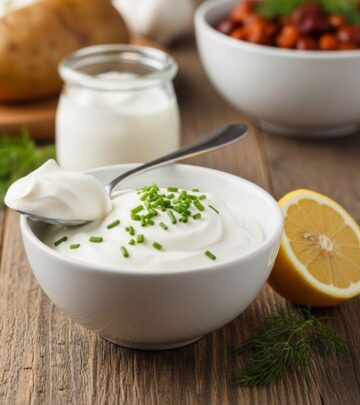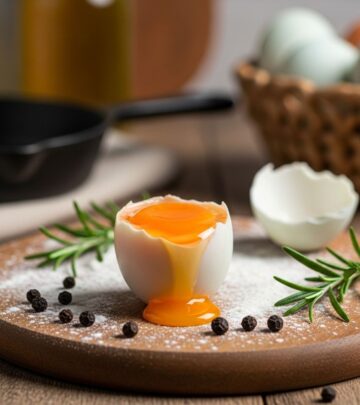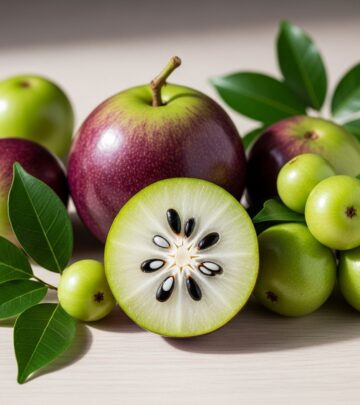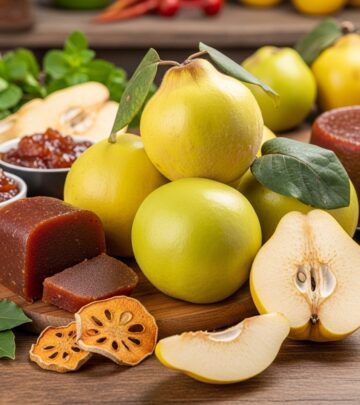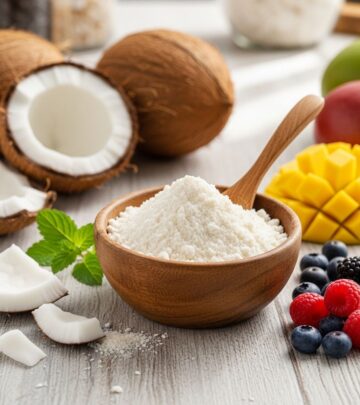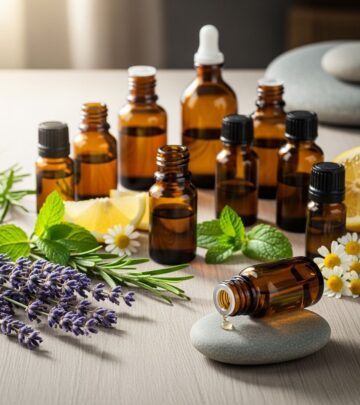Patchouli Essential Oil: Benefits, Uses, Side Effects, and FAQs
Harness its earthy aroma to enhance skin, hair, and emotional wellness safely.
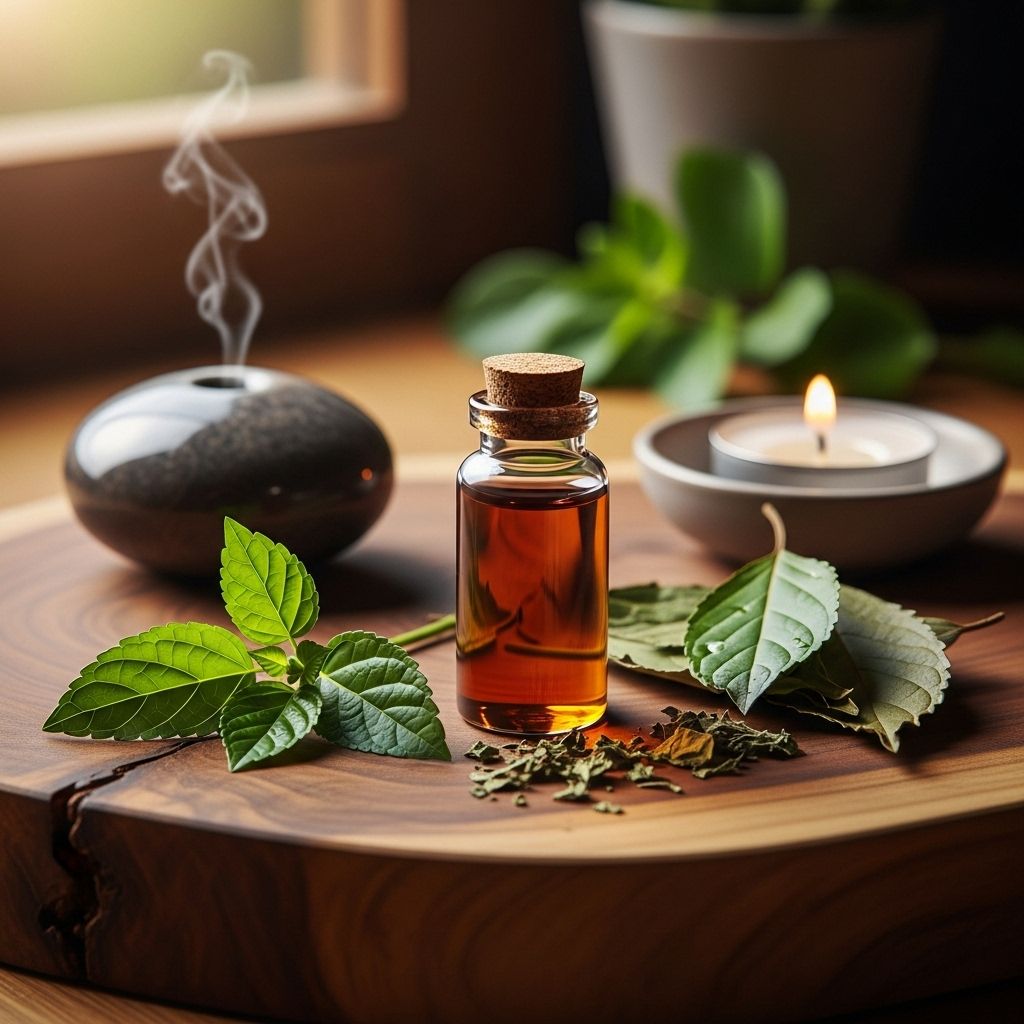
What Is Patchouli Essential Oil?
Patchouli essential oil, derived from the leaves of the Pogostemon cablin plant, is revered worldwide for its earthy, robust aroma and therapeutic properties. Native to Southeast Asia and widely cultivated in tropical regions like India and the Philippines, patchouli has long played a role in traditional medicine and rituals. Its extraction process typically involves steam-distilling the plant’s leaves to capture the highly potent, aromatic oil.
Active Compounds and Aromatic Profile
The distinctive scent and effects of patchouli oil stem from its rich composition of active constituents:
- Patchoulol – Responsible for grounding, mood-balancing effects
- α-Patchoulene & β-Patchoulene – Earthy, spicy fragrance
- α-Bulnesene & Caryophyllene – Noted for anti-inflammatory, antidepressant, and neuroprotective activity
- Norpatchoulenol, Seychellene, Pogostol – Contributing to its overall therapeutic profile
These compounds give patchouli oil a warm, musky scent, making it a favored ingredient in perfumes, air fresheners, and cosmetics.
Therapeutic Benefits of Patchouli Essential Oil
Patchouli oil provides a spectrum of valuable benefits rooted in its chemical complexity. Here are its most prominent advantages:
Skin Care Benefits
- Soothes dry, irritated skin – Its anti-inflammatory properties help reduce redness and calm dermatitis, eczema, and acne flare-ups.
- Deodorizes bad odor – The strong aroma neutralizes odors and is commonly used in underarm deodorants, soaps, and personal hygiene products.
- Accelerates wound healing – Encourages faster healing of cuts, bruises, and scars by supporting cell regeneration and reducing inflammation.
- Anti-aging effects – Rich in antioxidants, patchouli helps maintain youthful skin, scavenges free radicals from sun exposure, boosts collagen, and reduces the appearance of wrinkles and dark spots.
- Reduces acne and blemishes – Offers antibacterial and anti-inflammatory effects that curb swelling, redness, and bacteria-related breakouts.
- Balances oily skin – Acts as a natural astringent, helping tighten pores and reduce excess oil production for a cleaner, healthier complexion.
Hair and Scalp Care
- Promotes healthy scalp – Its antifungal nature helps prevent scalp infections and dandruff, promoting stronger hair growth and relieving dryness.
- Moisturizes and strengthens hair – Reduces roughness and prevents premature hair loss by improving scalp health and circulation.
Emotional & Mental Wellness
- Anti-depressant and calming – The oil’s aroma helps alleviate anxiety, stress, and depression, balancing emotions and encouraging relaxation during meditation or times of tension.
- Improves sleep quality – Aids in inducing restful sleep and alleviates symptoms of insomnia by creating a peaceful atmosphere.
- Boosts cognitive function – Inhalation of the oil can sharpen the mind, improve focus, and increase mental alertness.
General Health Benefits
- Repels insects naturally – Functions as a natural bug repellent against mosquitoes and pests for both people and in the home.
- Fights infection – Used in traditional remedies for colds, headaches, nausea, vomiting, diarrhea, and abdominal pain due to its antibacterial, antiviral, and antifungal efficacy.
- Acts as an aphrodisiac – Believed to stimulate sensual energy and libido.
- Works as a pain reliever – Anti-inflammatory and analgesic properties help soothe joint and muscle pains when applied topically (with a carrier oil).
- Regulates metabolic and digestive functions – Supports liver, stomach, and intestinal health, thereby boosting immunity and facilitating proper excretion.
- Purifies air and surfaces – Commonly used in diffusers and cleaning products to eliminate odors and purify the environment.
Key Scientific Properties
| Application Area | Main Effects | Key Properties |
|---|---|---|
| Cosmetic | Soothes skin, anti-aging, deodorant | Antifungal, Anti-inflammatory, Antiseptic, Astringent, Deodorant, Fungicide, Tonic, Cytophylactic |
| Odorous/Aromatherapy | Relieves stress, mood harmonizer, aphrodisiac | Anti-depressant, Antiphlogistic, Febrifuge, Sedative, Insecticide |
| Medicinal | Fights infection, pain relief, improves metabolism | Antifungal, Anti-inflammatory, Anti-septic, Astringent, Sedative, Tonic, Cicatrisant, Diuretic |
Common Uses of Patchouli Essential Oil
- Aromatherapy – Used in diffusers and inhalants to promote relaxation, balance, and focus
- Skincare formulations – Added to lotions, creams, balms, and cleansers for its healing and bacteria-fighting effects
- Personal hygiene products – Found in deodorants, soaps, and perfumes to improve scent and hygiene
- Haircare treatments – Incorporated into shampoos, scalp oils, and conditioners for dandruff control and scalp health
- Massage oils – Blended into carrier oils to relieve pain and inflammation
- Natural insect repellent – Sprayed or diffused to ward off mosquitoes and other pests
- Household cleaning – Used as an air freshener or surface cleanser to eliminate odors and germs
How to Use Patchouli Essential Oil
- Topical application – Always dilute with a carrier oil (like coconut or jojoba oil). Apply to skin for wound healing, moisturization, or pain relief.
- Diffusion – Add a few drops to an essential oil diffuser to disperse its scent for emotional wellness, better sleep, or air purification.
- Baths – Mix with a carrier oil and add to bathwater for a relaxing and soothing soak.
- Hair treatments – Incorporate into hair masks or scalp oils to address dryness and dandruff.
- Insect repellent spray – Blend with water or alcohol and spray on the skin or in rooms to ward off bugs.
DIY Patchouli Oil Recipes
- Relaxing Bath Blend:
Mix 4 drops patchouli oil, 4 drops lavender oil, 2 drops frankincense oil, and 2 tbsp carrier oil. Add to bathwater. - Overnight Hair Mask:
Blend 2 drops patchouli oil with 2 tbsp coconut oil. Massage into scalp, leave overnight, wash out next morning. - Natural Deodorant:
Combine 6 drops patchouli oil, 10 drops tea tree oil, 2 tbsp coconut oil, and 1/4 cup baking soda. Apply as needed.
Precautions and Side Effects
- Irritation risk: Always patch-test diluted oil before applying to larger skin areas. Pure essential oil may irritate sensitive skin.
- Internal use caution: Do not ingest patchouli essential oil unless guided by a certified professional.
- Pregnancy and children: Consult your healthcare provider before use during pregnancy or for children.
- Allergy risk: Discontinue use if redness, rash, or other sensitive reactions occur.
- Quality matters: Use only 100% pure, therapeutic-grade patchouli oil to ensure safety and effectiveness.
Frequently Asked Questions (FAQs)
Q: Can patchouli oil be used directly on skin?
A: No, patchouli essential oil should always be diluted with a carrier oil before application to prevent irritation or allergic reactions.
Q: Does patchouli oil help with acne?
A: Yes, its antibacterial and anti-inflammatory properties make patchouli oil effective in treating acne, reducing swelling and redness.
Q: How does patchouli oil benefit hair?
A: Patchouli oil helps improve scalp health, reduce dandruff, and moisturize dry or brittle hair, supporting stronger growth.
Q: Is patchouli oil safe for children?
A: Patchouli oil is not generally recommended for children; always consult a healthcare provider before use in children or during pregnancy.
Q: What is the scent of patchouli essential oil like?
A: Patchouli oil has a warm, earthy, musky, and slightly sweet aroma; it is used in many perfumes and aromatherapy blends.
Q: How does patchouli oil improve sleep?
A: Its calming scent helps relax the mind and body, facilitating restful sleep and relieving insomnia symptoms.
Q: Can patchouli oil be diffused in the home?
A: Absolutely. Diffusing patchouli oil can purify air, eliminate unwanted odors, repel insects, and create a peaceful environment.
Q: Are there any major side effects?
A: Side effects are rare but may include skin irritation or allergies. Always patch-test and avoid excessive use.
Conclusion
Patchouli essential oil stands out as a versatile natural remedy for enhancing skin, hair, emotional well-being, and overall health. Whether used in aromatherapy, personal care products, or household applications, its powerful compounds deliver tangible benefits that have been celebrated for centuries. With proper use and due care, patchouli oil can be a valuable addition to your wellness routines.
References
- https://www.newdirectionsaromatics.com/blog/the-harmonizing-benefits-of-patchouli-oil/
- https://juicychemistry.com/blogs/skincare-blog/all-the-benefits-of-patchouli-oil
- https://www.healthline.com/health/patchouli-oil
- https://nikura.com/blogs/essential-oils/benefits-and-uses-of-patchouli-oil
- https://www.doterra.com/US/en/blog/spotlight-patchouli-oil
- https://www.vinevida.com/products/patchouli-essential-oil
- https://www.edensgarden.com/blogs/news/6-reasons-why-we-love-patchouli-essential-oil
- https://www.hollandandbarrett.com/the-health-hub/natural-beauty/aromatherapy/what-is-patchouli/
Read full bio of medha deb


